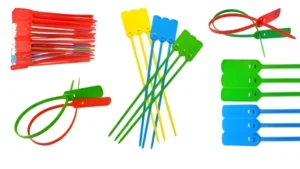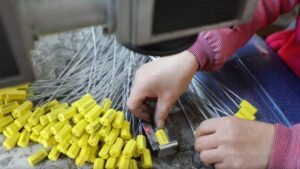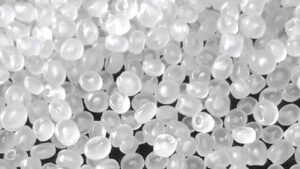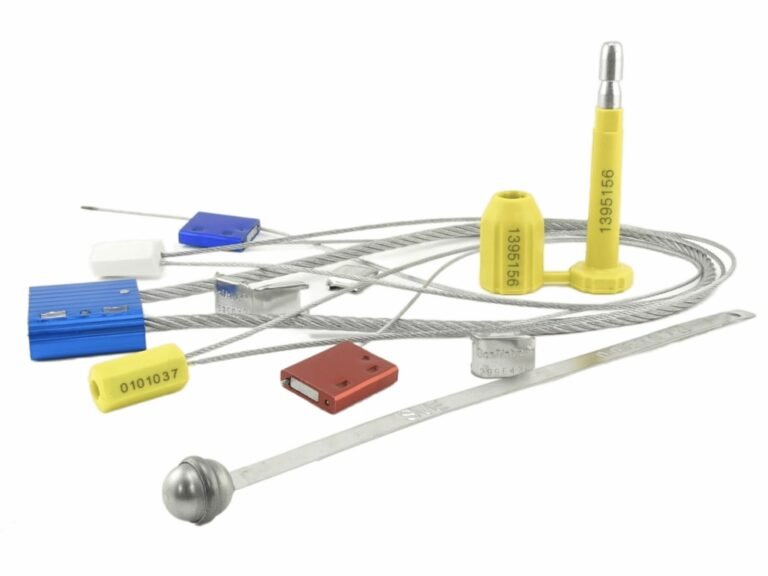Let’s be honest – when someone mentions “security seals”, the first thing that comes to your mind is that they are “safe” and protect our assets in logistics. They have functions such as anti-tampering and brand anti-counterfeiting. But there is a big question for manufacturers, logistics companies and environmentally conscious consumers to think about:
Can security seals actually be environmentally friendly?
Without a doubt, yes, the earth's environment is maintained by mankind, and the development of safety seals must also go green. This article will explore the green side of the sealing world and explain what the safety code really means in terms of biodegradable, recyclable and reusable to keep things safe and sustainable.
Biodegradable: Security Seals That Break Down, Not the Planet.

When something is biodegradable, it means it can naturally decompose into harmless elements thanks to bacteria, fungi, or other living organisms — ideally without leaving microplastic souvenirs behind.
Are security seals biodegradable?
Needless to say, traditional security seals don’t work.
Most security seals currently on the market are made of plastics such as high-density polyethylene (HDPE) or polypropylene (PP). Although these materials are strong and durable and can effectively prevent tampering, they hardly decompose in the natural environment and are not suitable for composting.
Environmental innovation is on the way!
In recent years, some environmental security seals manufacturer, are launching a new generation of plant-based biodegradable security seals. These seals are usually made of the following two materials:
- PLA (polylactic acid): A renewable plastic derived from corn starch or sugar cane.
- Starch-based polymers: naturally derived, biodegradable materials.
New material "trap"
While these new materials sound green, their degradation process requires specific conditions, such as:
- High temperature (above 50°C)
- Industrial composting environment with active microorganisms
This means:
- These materials remain difficult to degrade in ordinary landfills or oceans.
- Currently, many cities and countries do not have complete industrial composting facilities.
Therefore, if these "degradable seals" are thrown into ordinary trash cans at will, their fate will be not much different from traditional plastics.
♻️Recyclable: From Seal to Something New

Security seals are often single-use — rip, toss, done. But what if they didn’t have to end up in landfills?
Many security seals are already made from recyclable plastics like polypropylene (PP) and HDPE. If separated properly, they can be turned into useful products like:
Plastic crates
Automotive parts
Even new seals (entering full circle )
✅ Pro tip: Look for seals that are clearly labeled with recycling codes and avoid ones with mixed materials (like metal pins + plastic bodies), which complicate recycling.
Reusable: Smart Seals (In a Good Way)
Current seals do not support reuse, and some that can be reused are for environmental protection purposes and are not very safe.
With the development of technology, smart seals can be scanned and recorded multiple times by integrating technologies such as RFID, QR code or barcode. Although these seals usually need to be "reset" or reprogrammed after each use, they can still be reused in multiple transportation processes. However, the cost is high and they are generally used for the transportation of high-value goods.
According to the World Economic Forum, the world is expected to reduce plastic pollution by more than 20% by 2040 by switching from single-use packaging (including seals) to reusable models. I believe that in the future, more environmentally friendly and cheaper safety seals will be designed.
So… Can Security Seals Be Eco-Friendly?
The eco-friendliness of security seals isn’t black and white — or green and not-so-green.
Let’s recap:
| Type | Eco-Friendly Potential | Challenges |
|---|---|---|
| Biodegradable | ✅ Yes (if composted) | Needs industrial facilities |
| Recyclable | ✅ Yes | Needs proper sorting & processing |
| Reusable | ✅✅ Yes, very! | Upfront cost & system adjustments |
The bottom line?
Security seals can be eco-friendly — but it depends on the choices companies make and the infrastructure available.
If your brand or business is looking to go green, consider a combo of:
Sourcing recyclable or biodegradable seals
Switching to reusables for in-house logistics
Educating your team (and clients) on proper disposal
Purchasing nvironmentally friendly safety seals
ProtegoSeal is a security seal manufacturer with environmentally friendly practices. We commitment to sustainable development is embodied in the use of environmentally friendly materials. We has provided environmentally friendly security seals to many companies. If you are in need of purchasing environmentally friendly safety seals, please contact us.


